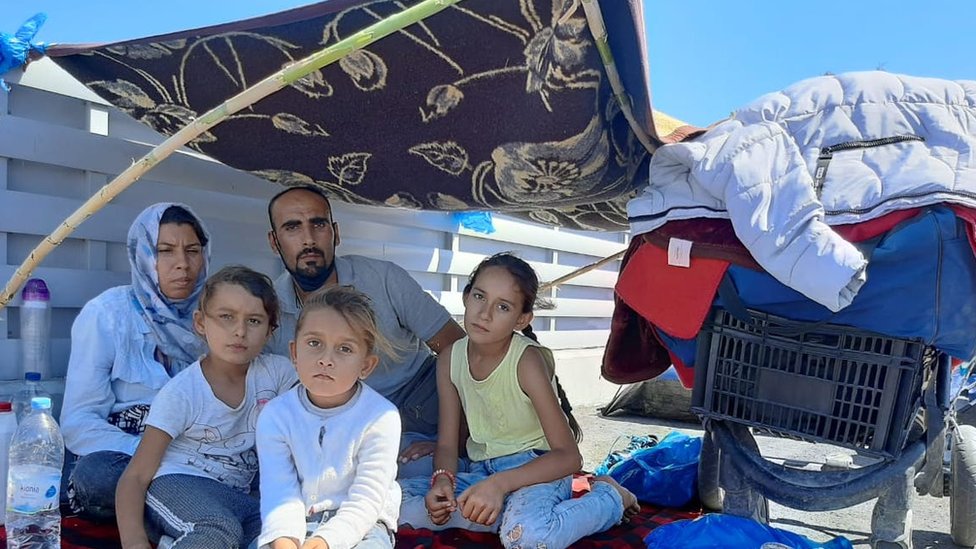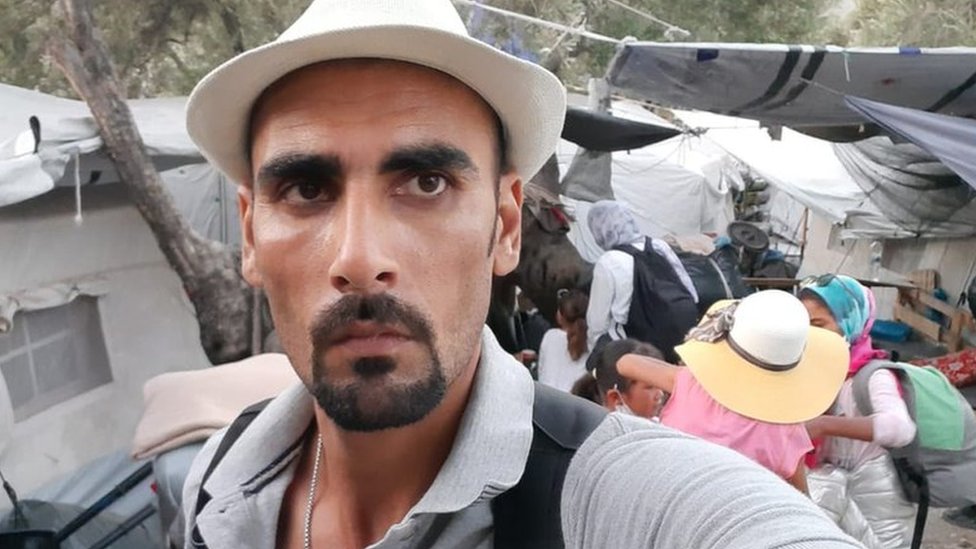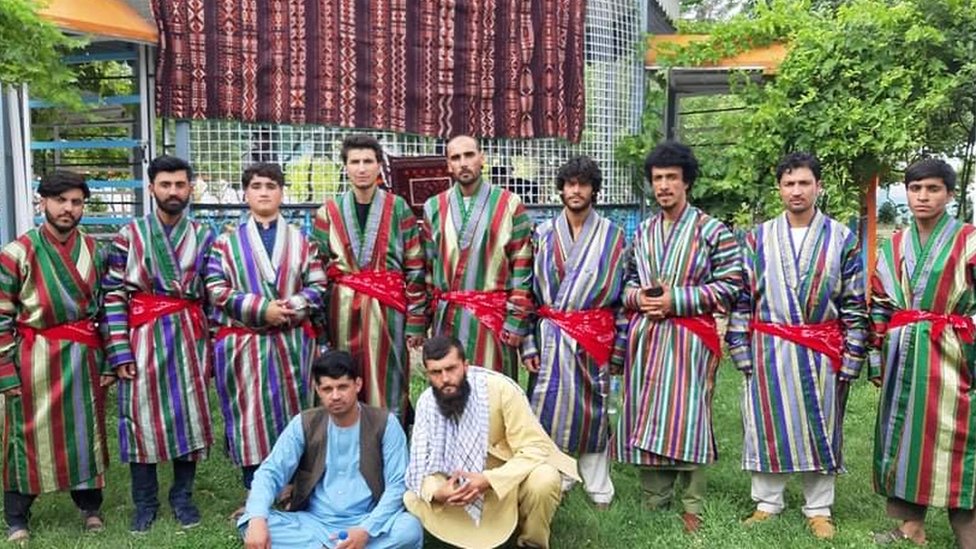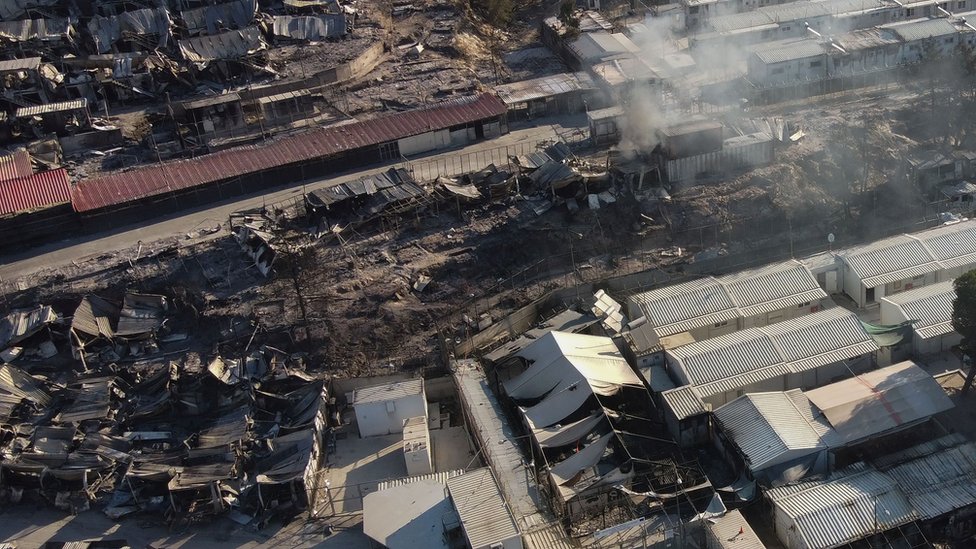By Kawoon Khamoosh
BBC World Service
 image copyrightTalibshah Hosseini
image copyrightTalibshah HosseiniTalibshah Hosseini picked up his three daughters, supported his sick wife and ran. Flames were surrounding their overcrowded tent in the sprawling migrant camp.
He had been awake, keeping an eye on supposedly small fires in the distance. The 37-year-old artist from Afghanistan then decided to take a closer look.
He advised families nearby to stay alert but when he returned to his tent, there was panic. “It was terrifying,” he says. “My little daughter was crying and asking ‘Daddy, are we going to die?'”
Helpless
The Hosseini family ran through bushes, jumped over fences and kept moving for 90 minutes until they reached safety.
They spent the night outdoors in a car park alongside thousands of asylum-seekers and migrants.
“My daughters were asking me: ‘Dad we are cold. Why we are here and what will happen to us?’ But I have no answer to any of those questions and it is very difficult.”
He says he has been “cheating death” ever since he left Afghanistan in 2019 to protect his family from Taliban militants.
And he has been counting the days ever since they arrived at Moria camp – nine months and five days.
The camp was only supposed to house 3,000 migrants but it has been home to more than 13,000. They include people from 70 countries, but most are from Afghanistan.
Terrible trauma
Mr Hosseini says his time at Moria has been the “most terrible experience of his life”. He witnessed a pregnant woman dying of stab wounds in the camp, as well as robbery and theft.
“I wasn’t able to sleep for nights,” he says. “I was afraid people might get into my tent, kill me or attack my family.”

For months, he lived in a small camping tent with his three daughters and his wife, who has kidney problems.
Just over a month ago, after repeated requests, they received a bigger tent to share with another family.
“We had just got our new tent and it is now burnt out,” he says. “If we hadn’t escaped, it would have taken all of us with it.”
The road to Lesbos
It is a long way from what was a prosperous life in Afghanistan, despite the constant conflict there.
Mr Hosseini was a leading member of the Faryab National Theatre in the north of the country.
He was also a celebrity in his hometown, appearing on TV shows as a satirist criticising insurgents as well as raising social and political issues.
In 2009, he got married and with his wife, they have three daughters: Farima (9), Parisa (7) and Marjan (4).

His wife worked in a beauty parlour and life was good until he criticised the Taliban and praised the Afghan military in one of his shows.
He started receiving threats from a local mullah and the Taliban.
“I love my country and I loved to work for the republic and the government but they didn’t support me when my life was in danger,” he says.
He has lost his father, two brothers and a nephew to the decades of violence in Afghanistan. It was time to go, the artist says.
As the family travelled through many countries to reach Europe, his eldest daughter Farima picked up a host of languages.
Mr Hosseini is proud of his “intelligent girl” but also worried about her. She was in the middle of primary school when they left Afghanistan.
“She keeps saying: ‘Daddy I don’t like you because you took my school from me, I am not happy.’ It’s so difficult for a father to let his child down,” he says, close to tears. “I can’t tell you how much it hurts.”
Thinking the unthinkable
It is a struggle to survive, despite efforts by the Greek authorities to support the homeless.
Mr Hosseini saw a van distributing food on Thursday but such was the demand, the driver was overwhelmed and left.
“People haven’t got anything with them. At night it’s very cold, and they haven’t got anything to cover themselves with,” he says.
“During the day it’s sunny and there’s no shade and they’re desperately looking for a piece of paper or cloth to keep out the sun.
“Children are crying and families are in a chaotic situation. They’re all terrified.”

Mr Hosseini says he has endured so much suffering on Lesbos that he is wondering whether fleeing Afghanistan was the right thing to do.
“There is no water, no food, no toilet and no doctors, I have mental issues and I don’t know what to do. I am full of regret,” he says.
“I can’t take anymore. It would be better deporting us if they are not going to give us asylum.”
Click Here to Visit Orignal Source of Article https://www.bbc.co.uk/news/world-europe-54116336


